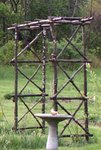 This cute bird, a little Carolina Wren sitting on a teasel, accompanied an article this week in the New York Times. The focus of the article was how the birds and wildlife on the author's property have increased and flourished as the landscape design has been relaxed and changed, allowing for a less artificial scheme. More of the native plants and their human-seen "messy" environments like brush piles have been expanded and encouraged, providing food, homes, and safety to many animals that weren't previously common. I liked the focus of the article and hope it influences every gardener to allow some of the natural world into their lives.
This cute bird, a little Carolina Wren sitting on a teasel, accompanied an article this week in the New York Times. The focus of the article was how the birds and wildlife on the author's property have increased and flourished as the landscape design has been relaxed and changed, allowing for a less artificial scheme. More of the native plants and their human-seen "messy" environments like brush piles have been expanded and encouraged, providing food, homes, and safety to many animals that weren't previously common. I liked the focus of the article and hope it influences every gardener to allow some of the natural world into their lives.
But, and there always seems to be a but with me, the very first sentence rubbed me the wrong way. " A few years ago, when I first glimpsed the azure wing of a bluebird in the hedgerow that borders my meadow..." I grew up and lived in suburbia most of my life. A privacy fenced backyard of 20 by 30 feet was considered large and had to contain areas of many uses, most of them kid-centric, meaning a large expanse of grass so children can wear themselves out playing and inventing games. There was little enough room for a flowerbed plus a decent sized vegetable garden to even consider a "hedgerow" or a "meadow". They are nice and desirable concepts but are not attainable by most Americans, the majority who live in cities and suburbia.
I read it as a subtle form of classism and it still rankles me. I shouldn't let it bother me and will soon get over it but I'm often struck how people can be unaware of how most other people live their lives. We tend to think that most people live lives similar to our own but that's not true. Our interests, motivations, relationships, and how we see our place in the world are vastly different, even when we live next door to each other.
Another part of me acknowledges that a good deal of my reaction is jealousy. I never imagined that I would some day also have a hedgerow and a meadow of my own. I deeply treasure that the flukes and capriciousness of my life, there was certainly no master plan or design involved, have brought me to my current state. I think my appreciation for my current ecological riches is vastly different than my neighbors' because of my background.
Sunday, January 07, 2007
You Have a What?
Subscribe to:
Post Comments (Atom)

3 Comments:
I love what you have written here. It is reminiscent of something an anthropologist or sociologist might say, being that those types are unusually sensitive to other's generalizations. I believe this author may have made this blunder in a naive attempt at eloquence. I work at one of the gardening catalog companies and have noticed a few writers whose amazing ability at descriptive writing didn't quite translate into narrative.
Hello Craig; Thank you for leaving a comment on The Vermont Gardener. I have feelings similar to what you have conveyed in your writing...and I guess that's the reason that I write the way I do. Although many people have no idea how great it is to own or have access to land, it's important to try to fill the void and explain the virtues as well as the accompanying trials.
You mention in your profile an interest in learning grafting. When I moved to this part of Vermont, I looked up Lewis Hill who at the time was interested in identifying and restoring antique apple trees. To be able to find a value resource and a welcoming teacher at the same time, makes a new interest such as grafting more meaningful and easier to learn. Last I knew Lewis and his wife had written 14 books on various aspects of gardening. Their interests went from apples to daylilies and now to berries. Like the gardening catalogs you often see, there are many resources that can help us make a little plot of land bigger or a big piece more beautiful.
Gardening wishes,
George Africa
http://vermontflowerfarm.com
http://thevermontgardener.blogspot.com
http://vermontgardens.blogspot.com
Anne Raver has been a longtime columnist for the NY Times. I read a book of her collected columns and from this know that she started out living in the metro NY area. It may be she only had a balcony garden, I can't remember. But the place she is living in and gardening now is the family homestead; it's where she grew up. I don't know if that makes her classist or not, but her longtime readers will know how she got there and why she has a meadow. And from living in NYC I'm sure she is aware that not everyone lives as she does.
Still, I have to agree with the point that most people think their listeners live and act as they do. I'm probably as guilty as anyone.
Post a Comment